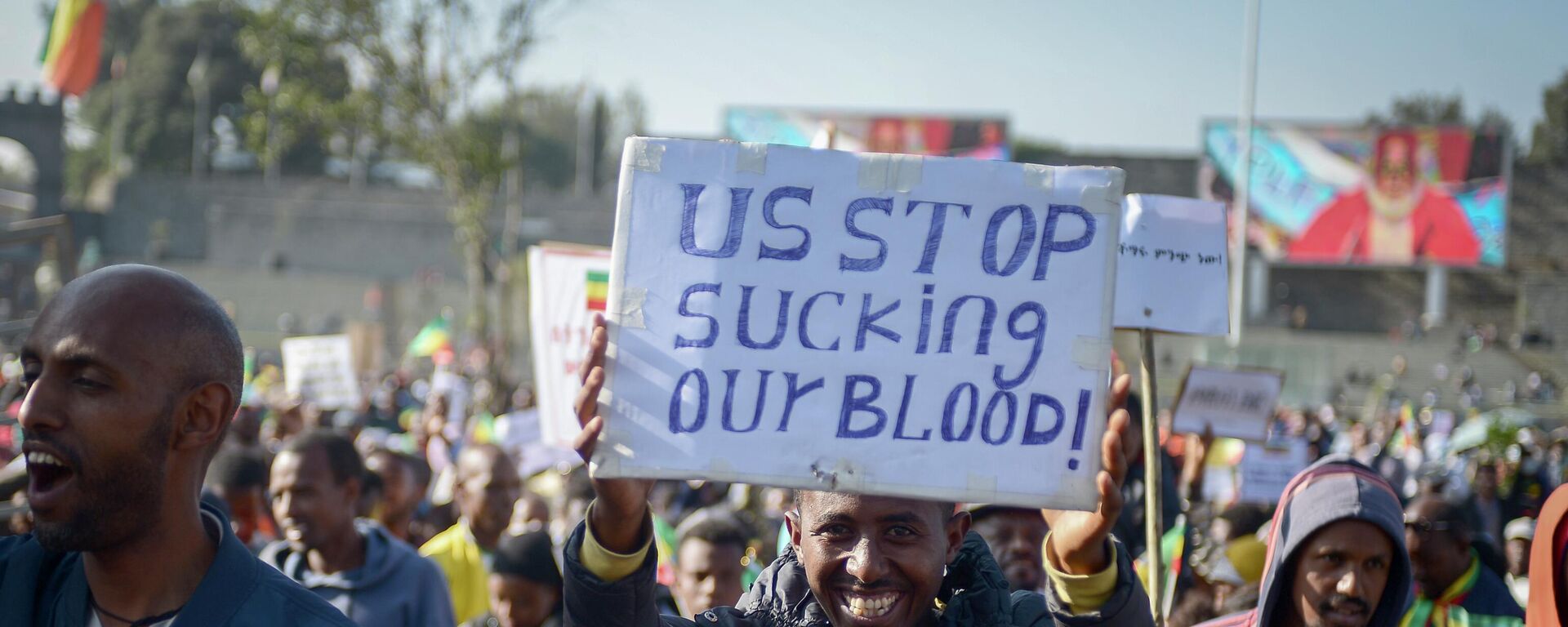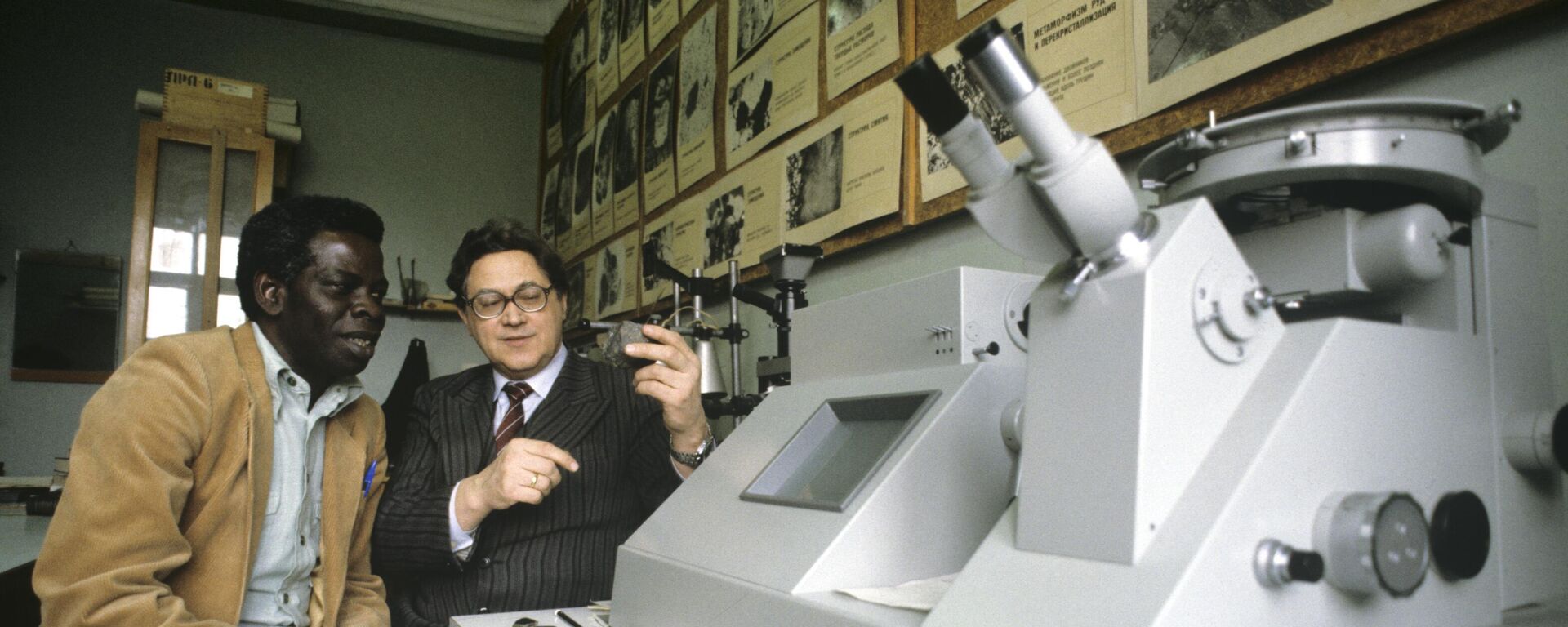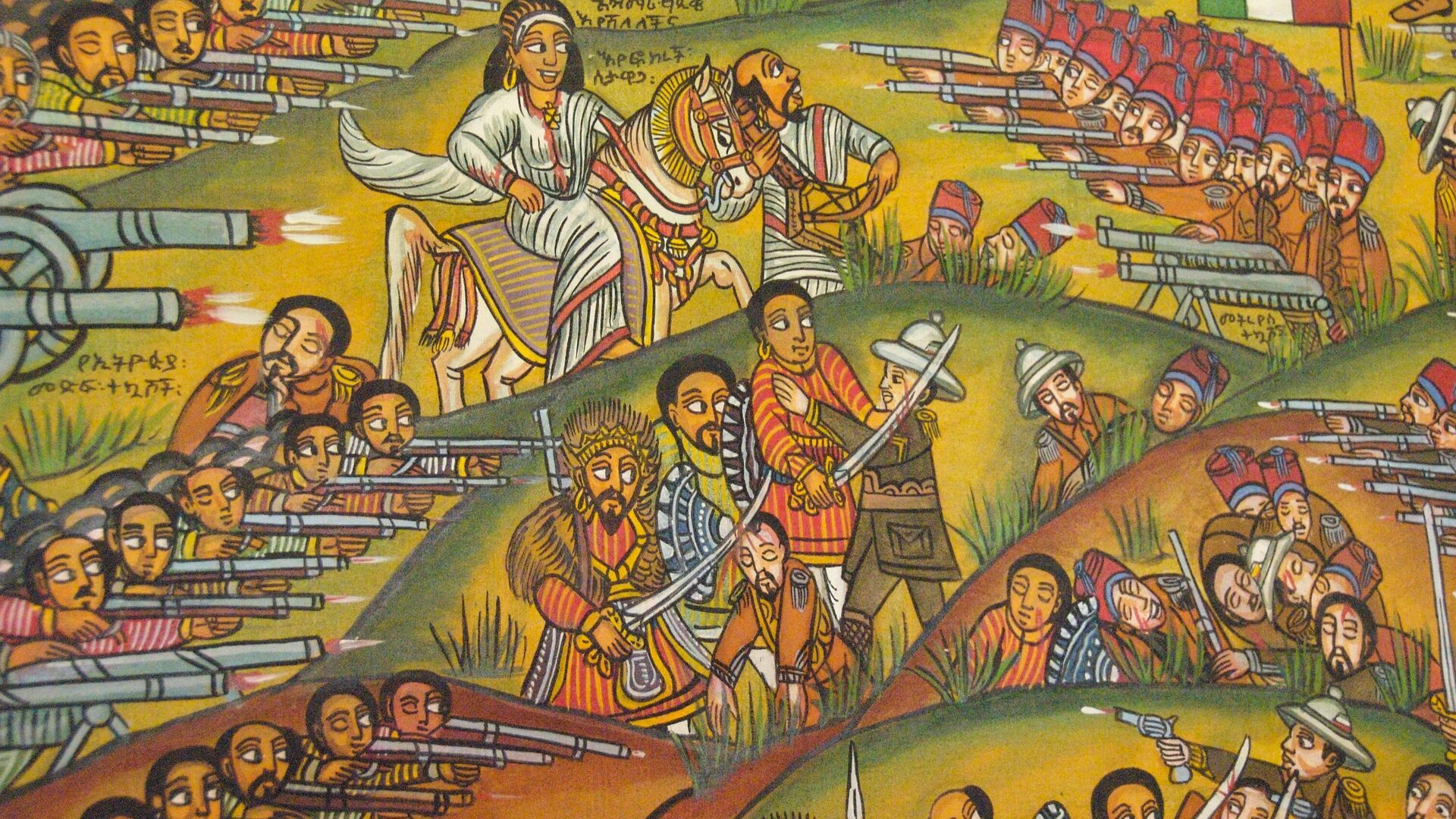https://sputnikglobe.com/20230301/battle-of-adwa-victory-over-european-supremacy-not-only-for-ethiopia-but-also-for-all-of-africa-1107897887.html
Battle of Adwa: Victory Over 'European Supremacy' Not Only For Ethiopia, But Also For All of Africa
Battle of Adwa: Victory Over 'European Supremacy' Not Only For Ethiopia, But Also For All of Africa
Sputnik International
On March 1, 1896, as most of the African continent has fallen into the hands of European colonial powers, the forces of the then Ethiopian Empire ensured a decisive victory against Italian invading army at the Battle of Adwa.
2023-03-01T14:17+0000
2023-03-01T14:17+0000
2023-03-05T11:00+0000
africa
africa in details
east africa
ethiopia
colonialism
battle
russia
italy
https://cdn1.img.sputnikglobe.com/img/07e7/03/01/1107906380_0:149:3024:1850_1920x0_80_0_0_4c19772e00432448bf30b5229470b202.jpg
Today, March 1, 2023, marks the 127th anniversary of the Battle of Adwa, where Ethiopian forces managed to defeat invading Italian troops and secure the independence and sovereignty of the Ethiopian Empire during the New Imperialism period, when European colonizers were scrambling for control of African land and resources. The battle came 11 years after the infamous Berlin Conference of 1884-85 that paved the way for the partition and colonization of Africa.The Battle of Adwa, which was the climax of the First Italo-Ethiopian War, took place in the early morning of Sunday, March 1, 1896, near the town of Adwa, located in Ethiopia's Tigray region. Supported by military equipment from the Russian Empire, as well as by a unit of Russian advisers, the army of Menelik II outnumbered the Italian forces, which were assisted by soldiers from the then-Italian-controlled Eritrea.After Italy's decisive defeat, the colonial power was forced to sign the Treaty of Addis Ababa in October 1896, which formally ended the First Italo-Ethiopian War on terms mostly favorable to the Ethiopian Empire and abrogated the Treaty of Wuchale that had been the core reason of the war. The previous treaty, signed between the Ethiopian Empire and Italy in May 1889, was initially aimed at promoting friendship and trade between the two nations, before Italy later claimed the agreement imposed a protectorate over Ethiopia, triggering a nearly two year-long war.The Battle of Adwa spoiled Italy's ambitious plans to expand its colonial empire in the Horn of Africa and also enforced the recognition of Ethiopia's sovereignty by other European colonial powers in the neighboring territories, in particular France and the United Kingdom, who concluded treaties with Ethiopia as an equal state.The battle became the first time in history when an African nation routed a strong European power since the time of General Hannibal of Carthage (present-day Tunisia), who, having "outsmarted and outdone the Roman army at every battle, besieged Rome itself," according to Haile Larebo, an associate professor at Morehouse College (US), Specialist in African Colonial History.Larebo underlines that the Ethiopian victory at Adwa invalidated the rules of the Berlin Conference of 1884-85 and "challenged the notion that 'might is right,' a doctrine that [had been] ingrained in the Western mind" since the discovery of the so-called New World.Hakim Adi, a professor of the History of Africa and the African Diaspora at the University of Chichester in the UK, says that the battle was a significant "example of an African state defending itself against colonial invasion."Another researcher, Shumet Sishagne, Ph.D., Professor Emeritus of History, Christopher Newport University, believes that the convincing Ethiopian victory at Adwa "signified not only the survival of Ethiopian independence, but symbolized also the first major challenge to European imperialism."Symbol of African SovereigntyAdi, a British historian of African descent, stresses that the victory of the Ethiopian Empire against Italy was "extremely important" not only for the East African nations, but also for the pan-African anti-colonialist movement, as it was a victory over the ideology of so-called "European supremacy." He adds that Ethiopia's Emperor Menelik II, who personally led his army during the Battle of Adwa, became very well known throughout Africa as well as throughout the African diaspora all around the globe.Larebo shares a similar point of view. He adds that the victory at Adwa made Ethiopia a "symbolic land for Pan-Africanism, representing African self-respect and independence from European cultural and political domination."The Morehouse College professor adds that Italy’s sudden attack without prior declaration of war against the Ethiopian Empire in 1935, triggering the Second Italo-Ethiopian War, shocked Black people worldwide. According to Larebo, the pan-Africanist movement and its individual members played a "major role" in the mobilization of public opinion against the "Fascist occupation" and their campaign assisted in maintaining the "integrity and independence of Ethiopia."Sishagne argues that almost all the first generation of leaders of the anti-colonial struggle "trace their political awakening to this Ethiopian inspiration." He insists Ethiopia showed Africans that a "different future, free of European domination," was possible.Russian Empire's Role in Menelik's Adwa VictoryRussia provided assistance to Ethiopia during the First Italo-Ethiopian War and at the climactic Battle of Adwa, which secured Ethiopian sovereignty until Italy's second aggression 40 years later. Speaking about the matter, the two experts acknowledged that the then Russian Empire – which was invited to the Berlin Conference, but did not participate in Europe's colonial activities in Africa – provided Ethiopian Emperor Menelik II with assistance that created the conditions for the final military victory against Italy at Adwa.Prof. Adi points out that the diplomatic alliance between the two emperors of Russia and Ethiopia was "extremely important" for the Ethiopian side, and it gave them the "ability" to defeat a European power such as Italy.Professor Sishagne sees the cooperation between the Russian and Ethiopian Empires from a different angle. He believes the Ethiopians have had a special regard for Russia at the time, largely due to their Orthodox Christian affiliation.Sishagne pointed out that the Russian Empire was the only country that sent a medical team to assist Ethiopians wounded at the battle of Adwa, adding that the establishment of the Menelik II Hospital in 1909, the first in Ethiopia, "owes its creation" to the Russian medical team.Long-Term Consequences of VictoryBoth Professors Adi and Larebo agree that Ethiopia's Adwa victory played and continues to play a significant role in the history and present of Ethiopia and Africa. Larebo believes that Ethiopia "inspired anti-colonialist movements" across Africa and was seen as a "beacon of hope and freedom by those under the yoke of colonialism." Adi adds that although the victory was achieved over a century ago, it's still celebrated as one of the most significant events in the modern history of Africa that Africans, not only on the continent, but even Africans in the diaspora "can be proud of." It's worth mentioning that the Adwa Victory Day is a public holiday in all regional states and charter cities across Ethiopia.
https://sputnikglobe.com/20221026/new-african-generation-has-decided-to-refuse-western-domination-african-activist-says-1102667444.html
https://sputnikglobe.com/20230220/reinvigorating-pan-africanism-is-critical-ethiopian-pm-says-1107629464.html
https://sputnikglobe.com/20230207/russians--africans-united-by-common-mentality-says-scholar-1107016839.html
africa
east africa
ethiopia
russia
italy
Sputnik International
feedback@sputniknews.com
+74956456601
MIA „Rossiya Segodnya“
2023
Muhammad Nooh Osman
https://cdn1.img.sputnikglobe.com/img/07e4/08/0e/1080170965_2:0:2050:2048_100x100_80_0_0_1de8233c87df0979e7e74f61b6ffacad.jpg
Muhammad Nooh Osman
https://cdn1.img.sputnikglobe.com/img/07e4/08/0e/1080170965_2:0:2050:2048_100x100_80_0_0_1de8233c87df0979e7e74f61b6ffacad.jpg
News
en_EN
Sputnik International
feedback@sputniknews.com
+74956456601
MIA „Rossiya Segodnya“
Sputnik International
feedback@sputniknews.com
+74956456601
MIA „Rossiya Segodnya“
Muhammad Nooh Osman
https://cdn1.img.sputnikglobe.com/img/07e4/08/0e/1080170965_2:0:2050:2048_100x100_80_0_0_1de8233c87df0979e7e74f61b6ffacad.jpg
adwa battle, menelik, ethiopia war, wthiopia italy, aswa pan-africanism, aswa pan africanism
adwa battle, menelik, ethiopia war, wthiopia italy, aswa pan-africanism, aswa pan africanism
Battle of Adwa: Victory Over 'European Supremacy' Not Only For Ethiopia, But Also For All of Africa
Muhammad Nooh Osman
Writer/Editor
Longread
On Sunday, March 1, 1896, as most of Africa had fallen into the hands of European colonial powers, the forces of the then-Ethiopian Empire, led by Emperor Menelik II, ensured a decisive victory against an invading Italian army at the Battle of Adwa, which secured Ethiopian sovereignty and became a preeminent symbol of pan-Africanism.
Today, March 1, 2023, marks the 127th anniversary of the Battle of Adwa, where Ethiopian forces managed to defeat invading Italian troops and secure the independence and sovereignty of the Ethiopian Empire during the New Imperialism period, when European colonizers were scrambling for control of African land and resources. The battle came 11 years after the infamous Berlin Conference of 1884-85 that paved the way for the partition and colonization of Africa.
The Battle of Adwa, which was the climax of the First Italo-Ethiopian War, took place in the early morning of Sunday, March 1, 1896, near the town of Adwa,
located in Ethiopia's Tigray region. Supported by military equipment from the Russian Empire, as well as by a unit of Russian advisers, the army of Menelik II outnumbered the Italian forces, which were assisted by soldiers from the then-Italian-controlled Eritrea.
After Italy's decisive defeat, the colonial power was forced to sign the Treaty of Addis Ababa in October 1896, which formally ended the First Italo-Ethiopian War on terms mostly favorable to the Ethiopian Empire and abrogated the Treaty of Wuchale that had been the core reason of the war. The previous treaty, signed between the Ethiopian Empire and Italy in May 1889, was initially aimed at promoting friendship and trade between the two nations, before Italy later claimed the agreement imposed a protectorate over Ethiopia, triggering a nearly two year-long war.
The Battle of Adwa spoiled Italy's ambitious plans to expand its colonial empire in the Horn of Africa and also enforced the recognition of Ethiopia's sovereignty by other European colonial powers in the neighboring territories, in particular France and the United Kingdom, who concluded treaties with Ethiopia as an equal state.

26 October 2022, 10:15 GMT
The battle became the first time in history when an African nation routed a strong European power since the time of General Hannibal of Carthage (present-day Tunisia), who, having "outsmarted and outdone the Roman army at every battle, besieged Rome itself," according to Haile Larebo, an associate professor at Morehouse College (US), Specialist in African Colonial History.
Larebo underlines that the Ethiopian victory at Adwa invalidated the rules of the Berlin Conference of 1884-85 and "challenged the notion that 'might is right,' a doctrine that [had been] ingrained in the Western mind" since the discovery of the so-called New World.
Hakim Adi, a professor of the History of Africa and the African Diaspora at the University of Chichester in the UK, says that the battle was a significant "example of an African state defending itself against colonial invasion."
"Obviously, it's a key victory for an African country, an African state against [...] an invading European power in the form of Italy that was attempting to essentially, to colonize, to establish a protectorate over Ethiopia," Professor Adi tells Sputnik. "So it's a major victory for Ethiopia, but also for the entire continent."
Another researcher, Shumet Sishagne, Ph.D., Professor Emeritus of History, Christopher Newport University, believes that the convincing Ethiopian victory at Adwa "signified not only the survival of Ethiopian independence, but symbolized also the first major challenge to European imperialism."
"The victory was perceived by black people everywhere as their own victory against racism and domination," Sishagne went on to say.
Symbol of African Sovereignty
Adi, a British historian of African descent, stresses that the victory of the Ethiopian Empire against Italy was "extremely important" not only for the East African nations, but also for the pan-African anti-colonialist movement, as it was a victory over the ideology of so-called "European supremacy." He adds that Ethiopia's Emperor Menelik II, who personally led his army during the Battle of Adwa, became very well known throughout Africa as well as throughout the African diaspora all around the globe.
"So, Ethiopia assumed a kind of central place, as I say, as a symbol of African independence, African sovereignty, and also the idea that, you could say that the victory at Adwa undermined the idea of European superiority, of European supremacy," the professor says.
Larebo shares a similar point of view. He adds that the victory at Adwa
made Ethiopia a "symbolic land for Pan-Africanism, representing African self-respect and independence from European cultural and political domination."
"For many Pan-Africanists, Ethiopia, as the only major African country that thwarted a European colonization attempt, served as the blueprint for a future Africa, to be born and recreated," the African-American researcher states.
The Morehouse College professor adds that Italy’s sudden attack without prior declaration of war against the Ethiopian Empire in 1935, triggering the Second Italo-Ethiopian War, shocked Black people worldwide. According to Larebo, the pan-Africanist movement and its individual members played a "major role" in the mobilization of public opinion against the "Fascist occupation" and their campaign assisted in maintaining the "integrity and independence of Ethiopia."
Sishagne argues that almost all the first generation of leaders of the anti-colonial struggle "trace their political awakening to this Ethiopian inspiration." He insists Ethiopia showed Africans that a "different future, free of European domination," was possible.

20 February 2023, 15:48 GMT
Russian Empire's Role in Menelik's Adwa Victory
Russia provided assistance to Ethiopia during the First Italo-Ethiopian War and at the climactic Battle of Adwa, which secured Ethiopian sovereignty until Italy's second aggression 40 years later. Speaking about the matter, the two experts acknowledged that the then Russian Empire – which was invited to the Berlin Conference, but did not participate in Europe's colonial activities in Africa – provided Ethiopian Emperor Menelik II with assistance that created the conditions for the final military victory against Italy at Adwa.
"Russia was the only major European power that openly dismissed Italy’s claim of protectorate over Ethiopia. It provided Ethiopia with generous arms supplies in autumn 1895, but the weapons arrived in 1896 after the battle," says Larebo. "However, in 1896, thanks to donations and money raised largely by spontaneous fundraising campaigns, a large field ambulance from the Russian Red Cross Mission was sent to Ethiopia, which treated over 30,000 soldiers wounded in the battle."
Prof. Adi points out that the diplomatic alliance between the two emperors of Russia and Ethiopia was "extremely important" for the Ethiopian side, and it gave them the "ability" to defeat a European power such as Italy.
"That diplomatic alliance was very important from the Ethiopian point of view in that it gave them the ability, or it assisted them, in standing up to Italy. Of course, Russia also provided some financial support and some military support in terms of arms and also military advice," says Prof. Hakim Adi.
Professor Sishagne sees the cooperation between the Russian and Ethiopian Empires from a different angle. He believes the Ethiopians have had a special regard for Russia at the time, largely due to their Orthodox Christian affiliation.
"At the peak of the dispute, Ras Makonnen, the highest ranking official under Emperor Menelik, wrote to the Russian minister of war that he has not seen any European power that wishes Ethiopia well, except 'Orthodox Russia'," he notes.
Sishagne pointed out that the Russian Empire was the only country that sent a medical team to assist Ethiopians wounded at the battle of Adwa, adding that the establishment of the Menelik II Hospital in 1909, the first in Ethiopia, "owes its creation" to the Russian medical team.

7 February 2023, 14:25 GMT
Long-Term Consequences of Victory
Both Professors Adi and Larebo agree that Ethiopia's Adwa victory played and continues to play a significant role in the history and present of Ethiopia and Africa.
Larebo believes that Ethiopia "inspired anti-colonialist movements" across Africa and was seen as a "beacon of hope and freedom by those under the yoke of colonialism."
"After [the achievment of] Africa's independence, Ethiopia was chosen as the Pan-African/the continent organization’s capital and the tricolor of its national flag was adopted by Pan-African movements, attesting to the country’s age-old independence from Western supremacy, with red standing for the blood men must shed for their redemption and liberty, green for the vegetation of the African motherland, and gold representing the mineral wealth of Ethiopia/Africa," says Larebo.
Adi adds that although the victory was achieved over a century ago, it's still celebrated as one of the most significant events in the modern history of Africa that Africans, not only on the continent, but even Africans in the diaspora "can be proud of."
It's worth mentioning that the Adwa Victory Day is a public holiday in all regional states and charter cities across Ethiopia.
"People still remember it as symbolizing African sovereignty, African independence in the face of the scramble that was taking place at that time," Adi says. "Adwa didn't completely defend Ethiopia against colonial rule, but it was still a major, major victory, which I say people still celebrate and are inspired by today. So, it's extremely important and significant."






